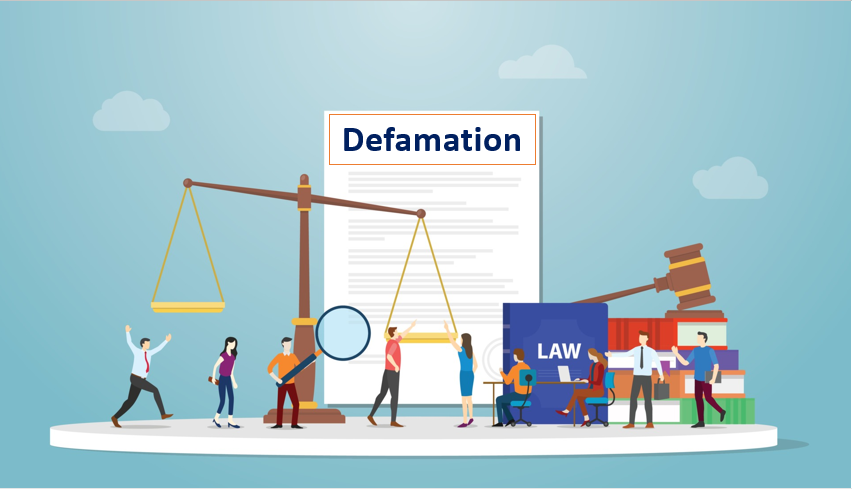Published On: 15th June, 2024

Authored By: Shivam Raj
THE ICFAI UNIVERSITY, HYDERABAD
Introduction:
A period marked by unknown connectedness, invention, and data-driven decision-making- timber has begun with the arrival of the digital age. In the current digital terrain, particular data has become essential to information frugality, supporting the operations of multitudinous sectors and impacting people’s everyday lives all over the world. particular data is an intricate web of information that’s extremely precious to governments, pots, and other stakeholders. It includes anything from health records and biometric identifiers to social media relations and online deals.
But in addition to all the advantages that the digital revolution has brought about, worries about data security, sequestration, and the loss of particular freedom have also gained elevation. In the digital age, power rights, control, and ethical stewardship have become important problems due to the wide gathering, analysis, and monetization of particular data. The idea that particular data is property has gained traction in response to these difficulties, furnishing a satisfying frame for reconsidering the connection that people have with their data.
The preface of digital technologies and the internet has fully changed how we engage, communicate, and do business. particular data has become a digital frugality’s currency in our connected world, enabling targeted marketing, fostering invention, and impacting how opinions are made. still, there are now serious worries over individual rights, security, and sequestration due to the wide gathering and use of particular data. In light of this, the idea that particular data is property has gained fashion ability and provides a possible frame for resolving these issues while giving people more control over their data.
Defining Personal Data:
Personal data encompasses a wide range of information that relates to an identifiable existence. This includes but isn’t limited to, name, address, dispatch, phone number, social security number, fiscal records, browsing history, social media posts, and biometric data. The proliferation of digital bias and online services has led to the generation of vast quantities of particular data on a diurnal base, creating a rich shade of information that can be anatomized, manipulated, and monetized by colorful stakeholders. At its core, particular data encompasses a broad diapason of information that’s innately tied to an identifiable existence. This encompasses not only traditional identifiers similar to names, addresses, and social security figures but also extends to further nuanced aspects of identity, including online geste patterns, preferences, and indeed physiological characteristics. In a period marked by the proliferation of internet-connected bias, social media platforms, and digital services, the generation and collection of particular data have reached unknown situations, fuelling a data-driven frugality that thrives on perceptivity deduced from individual relations and behaviors.
The Evolution of Personal Data as Property:
Historically, personal data has been treated as a resource to be exploited rather than as property to be possessed and controlled by individualities. still, growing enterprises about data sequestration, security breaches, and unauthorized data operation have urged a revaluation of this paradigm. The conception of particular data as property posits that individualities should have power rights over their data, akin to traditional property rights, including the right to control access, use, and dispersion of their data. Traditionally, particular data has been treated as a commodity to be gathered, anatomized, and monetized by pots and other realities, frequently without due consideration for the rights and interests of the individualities to whom it pertains. still, in recent times, a growing mindfulness of the essential value and perceptivity of particular data has urged a paradigm shift in how we perceive and govern its operation. The conception of particular data as property challenges the prevailing narrative by asserting individualities’ rights to power and control over their data, thereby investing them with lesser agency and autonomy in the digital sphere.
Ownership Rights and Control:
Central to the conception of personal data as property is the principle of power rights and control, which posits that individualities should retain the authority to determine the fate of their particular data. This includes the capability to grant or drop concurrence for its collection and operation, specify the purposes for which it may be employed, and demand translucency and responsibility from data collectors and processors. By vesting individualities with lesser control over their data, the frame of particular data as property seeks to rebalance the power dynamics essential in the data ecosystem and empower individualities to assert their rights in a decreasingly digitized world. Let’s claw deeper into the crucial factors of power rights and control in the environment of particular data:
-
Consent and Authorization:
Individualities should have the right to give informed concurrence for the collection, processing, and sharing of their particular data. This means that data regulators and processors must gain unequivocal concurrence from individualities before collecting their data and informing them about the purposes for which it’ll be used. also, individualities should have the capability to drop their concurrence at any time and request the omission or correction of their data.
-
Transparency and Accountability:
Data regulators and processors have a responsibility to be transparent about their data practices and to ensure responsibility for how personal data is handled. This includes furnishing clear and accessible sequestration programs that outline the types of data collected, the purposes for which it’s used, and the third parties with whom it’s participated. also, data regulators should apply robust security measures to protect particular data from unauthorized access, exposure, or abuse.
-
Access and Portability:
Individualities should have the right to pierce their particular data and admit a dupe of it in a generally used electronic format. This enables individualities to review the delicacy and absoluteness of their data and exercise lesser control over its operation. also, individualities should have the capability to transfer their data from one service provider to another, easing data portability and interoperability between different platforms and services.
-
Purpose Limitation and Minimization:
Personal data should only be collected and reused for specific, licit purposes and shouldn’t be used for purposes inharmonious to those for which it was first collected. Additionally, data should not be kept for as long as is required to achieve those goals; data collection should be restricted to the degree necessary to achieve the stated utilization. This principle helps alleviate the threat of data abuse and unauthorized access while conserving individual sequestration and autonomy.
-
Data Protection by Design and Default:
Data regulators should apply sequestration- enhancing measures by design and by dereliction, icing that sequestration considerations are integrated into the design and development of products, services, and systems from the onset. This includes enforcing data minimization ways, pseudonymization, encryption, and other measures to alleviate sequestration pitfalls and enhance data security. By espousing a sequestration- centric approach to data operation, associations can make trust with consumers and demonstrate their commitment to esteeming individualities’ sequestration rights.
Privacy Concerns and Ethical Considerations:
One of the primary provocations behind framing particular data as property is to enhance sequestration protections and empower individualities to assert lesser control over their data. still, this approach raises ethical questions about the commodification of particular information and the eventuality for exploitation and abuse. also, the monetization of particular data through targeted advertising, data brokerage, and algorithmic profiling raises enterprises about fairness, demarcation, and manipulation. Balancing the benefits of data- driven invention with the need to guard individual sequestration rights requires a nuanced approach that takes into account ethical considerations and societal values. While the conception of particular data as property holds the pledge of enhancing individual sequestration protections, it also raises a host of ethical considerations. The commodification of particular information and its posterior monetization through targeted advertising, data brokerage, and algorithmic profiling rise abecedarian questions about concurrence, autonomy, and the indifferent distribution of benefits and pitfalls. also, the eventuality for data exploitation, demarcation, and manipulation underscores the need for ethical fabrics that prioritize the rights and quality of individualities over marketable interests and technological imperatives.
Case Laws:
-
Justice K.S. Puttaswamy (Retd.) and Anr. V. Union of India and Ors.
This case, commonly referred to as the “Aadhaar case,” revolved around the constitutional validity of the Aadhaar biometric identification system and its implications for privacy rights in India.
Background:
The Aadhaar system, launched in 2009, aimed to provide every resident of India with a unique biometric identity number linked to demographic and biometric information. It was envisioned as a tool for improving the efficiency of government welfare programs, enhancing service delivery, and combating identity fraud and corruption.
Key Issues:
The primary issue before the Supreme Court of India in the Aadhaar case was whether the Aadhaar scheme violated the fundamental right to privacy under Article 21 of the Indian Constitution. The petitioners argued that the collection and storage of biometric data under Aadhaar posed significant risks to privacy and individual autonomy. They contended that Aadhaar lacked robust safeguards against data breaches, unauthorized access, and misuse, raising concerns about surveillance, identity theft, and profiling.
Supreme Court Judgment:
In the major judgment delivered in September 2018, the Supreme Court of India upheld the constitutionality of the Aadhaar scheme while assessing significant restrictions on its perpetration. The court honoured the significance of sequestration as a abecedarian right and affirmed that the right to sequestration encompassed instructional sequestration, including control over particular data. However, it also held that the collection of biometric data under Aadhaar was justified by the state’s legitimate interests in ensuring efficient governance and targeting welfare benefits.
The Aadhaar case served as a catalyst for legislative and policy reforms aimed at strengthening data protection and privacy frameworks in India. It prompted the drafting of the Data Personal Data Protection Bill 2023, which seeks to establish comprehensive data protection laws in line with global standards and best practices. Additionally, the judgment prompted government agencies and private entities to reassess their data handling practices and adopt measures to ensure compliance with data protection norms and principles.
In summary, the Aadhaar case represents a landmark moment in India’s journey towards establishing a robust legal and regulatory framework for data protection and privacy rights. It underscores the importance of balancing technological innovation and governance with respect for individual rights and freedoms in an increasingly digital world.
-
WhatsApp Privacy Policy case.
In January 2021, WhatsApp, a popular messaging platform owned by Facebook, updated its privacy policy, notifying users that it would begin sharing user data with Facebook and its subsidiaries for targeted advertising and other purposes. This update sparked widespread controversy and led to multiple legal challenges, including a petition filed before the Delhi High Court.
Background:
The controversy surrounding WhatsApp’s updated privacy policy stemmed from concerns about the extent to which user data would be shared with Facebook and other third-party entities. The new policy raised questions about user consent, data security, and the potential for exploitation of personal data for commercial purposes. In response to the backlash, WhatsApp initially postponed the implementation of the updated policy but maintained that users would eventually be required to accept the changes to continue using the service.
Key Issues:
The main issues raised in the legal challenge to WhatsApp’s privacy policy included:
User Consent: The petitioners argued that WhatsApp’s updated privacy policy violated users’ right to privacy and autonomy by compelling them to consent to the sharing of their personal data with Facebook and its subsidiaries. They contended that the policy lacked transparency and clarity regarding the purposes and implications of data sharing, making it difficult for users to make informed decisions.
Legal Proceedings:
The case was heard before the Delhi High Court, which issued notices to WhatsApp and the Indian government seeking responses to the petitioners’ allegations. The court conducted several hearings to examine the legality and implications of WhatsApp’s privacy policy and to assess the adequacy of existing data protection laws in safeguarding users’ rights.
Outcome:
The Delhi High Court’s decision in the WhatsApp Privacy Policy case is pending as of the time of writing this case study. However, the case has generated significant public debate and scrutiny of tech companies’ data practices, prompting calls for stronger data protection laws and regulatory oversight in India. Regardless of the court’s final decision, the case underscores the importance of transparency, accountability, and user consent in data handling practices and highlights the need for robust legal and regulatory frameworks to protect individuals’ privacy rights in the digital age.
In conclusion, the WhatsApp Privacy Policy case represents a landmark legal challenge to data sharing practices of tech companies operating in India. It underscores the growing awareness and concerns surrounding data privacy and protection and highlights the need for stronger legal and regulatory safeguards to address emerging challenges in the digital ecosystem.
Emerging Trends and Future Directions:
As technology continues to advance and data- driven invention accelerates, new challenges and openings are likely to crop in the realm of personal data power and control. Arising trends similar as data sovereignty, decentralized identity, and blockchain- grounded results hold pledge for empowering individualities with lesser control over their data while enhancing sequestration and security protections. still, realizing the full eventuality of these technologies will bear collaboration between policymakers, technologists, and civil society to develop robust nonsupervisory fabrics and ethical guidelines. Looking ahead, several arising trends hold the eventuality to reshape the geography of personal data power and control. generalities similar as data sovereignty, decentralized identity, and blockchain- grounded results offer innovative approaches to empower individualities with lesser autonomy and security over their data. still, the consummation of these technologies’ transformative implicit hinges upon the development of robust nonsupervisory fabrics, ethical guidelines, and mechanisms for responsibility and translucency. As technology continues to advance at a rapid-fire pace, new trends and developments are reshaping the geography of personal data power, sequestration, and security. These arising trends hold the eventuality to both enhance individual commission and pose new challenges for data governance and nonsupervisory compliance. Let’s explore some of the crucial arising trends and unborn directions in the realm of personal data:
-
Data Sovereignty:
The idea of” data sovereignty” is getting more popular as nations try to claim lower authority over the data produced inside their borders. The idea of data sovereignty holds that information created by individualities or associations operating under a certain government should be governed by the rules and laws of that government. Data localization rules that bear businesses to store and exercise data locally have been passed as a result of this trend, perfecting resident insulation rights and data protection. still, data sovereignty rules also make businesses concerned about internet fragmentation and walls to cross-border data flows.
-
Decentralized Identity:
Decentralized identity results, powered by blockchain technology, are arising as a promising approach to empowering individualities with lesser control over their digital individualities and particular data. Decentralized identity platforms enable individualities to produce and manage their digital individualities independent of centralized authorities, similar as governments or social media companies. By using cryptographic ways and distributed tally technology, decentralized identity results offer enhanced sequestration, security, and interoperability, allowing individualities to widely expose personal information while retaining control over their data.
-
Blockchain-Based Data Governance:
Blockchain technology is being explored as a means of establishing transparent and tamper- evidence data governance fabrics that prioritize sequestration, security, and stoner control. By recording data deals on a decentralized tally, blockchain- grounded data governance platforms give lesser translucency and auditability, reducing the threat of data manipulation and unauthorized access. also, blockchain technology enables the perpetration of smart contracts, which automate data operation processes and apply predefined rules and warrants, thereby enhancing data sequestration and security.
-
Privacy-Preserving Technologies:
A growing emphasis is being placed on developing sequestration- conserving technologies that enable data analysis and sharing without compromising individual sequestration rights. ways similar as homomorphic encryption, discrimination sequestration, and secure multi-party calculation allow data to be reused and anatomized while remaining translated or anonymized, thereby guarding sensitive information from unauthorized access or exposure. These sequestration- conserving technologies enable associations to decide perceptivity from data while mollifying the threat of sequestration breaches and maintaining compliance with data protection regulations.
-
Ethical AI and Algorithmic Governance:
With the adding integration of artificial intelligence (AI) and machine literacy algorithms into decision- making processes, there’s a growing recognition of the need for ethical AI fabrics and algorithmic governance mechanisms. Ethical AI fabrics seek to ensure that AI systems are developed and stationed in a manner that’s fair, transparent, and responsible, while algorithmic governance mechanisms aim to regulate the use of algorithms in critical disciplines similar as healthcare, finance, and felonious justice. By promoting algorithmic translucency, responsibility, and fairness, these enterprises strive to alleviate the pitfalls of algorithmic bias, demarcation, and unintended consequences.
Conclusion:
The conception of personal data as property represents a abecedarian shift in our understanding of data power, sequestration, and control in the digital age. By feting individualities as the due possessors of their particular data and swinging them lesser autonomy and agency over its operation, we can foster a further indifferent and transparent data ecosystem that upholds abecedarian rights and values.
Throughout this disquisition, we’ve examined the evolving geography of personal data power and sequestration rights, probing into crucial generalities similar as power rights and control, sequestration enterprises, legal fabrics, and arising trends. We’ve seen how individualities are asserting their rights to control their particular data, demanding translucency, responsibility, and ethical stewardship from data collectors and processors. also, we’ve explored the challenges and complications essential in navigating the globalized nature of data flows and the jurisdictional challenges posed by divergent nonsupervisory fabrics.
In conclusion, the conception of personal data as property embodies a vision of data governance that prioritizes individual rights, autonomy, and quality in a decreasingly digitized world. By embracing this paradigm shift, we can foster a data ecosystem that respects and protects the sequestration and security of individualities while promoting invention, profitable growth, and societal well- being. Only through cooperative action and a commitment to ethical data practices can we harness the transformative eventuality of personal data while securing abecedarian rights and values in the digital period.



